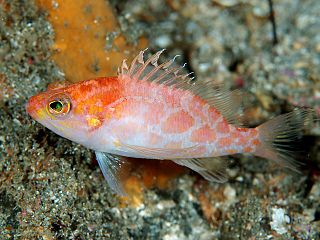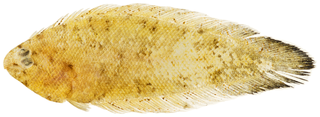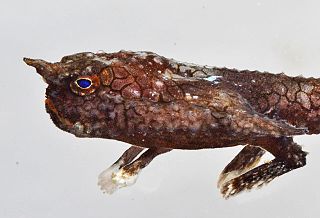
Scyliorhinus is a genus of catsharks in the family Scyliorhinidae. This genus is known in the fossil records from the Cretaceous period, late Albian age to the Pliocene epoch.

Leporinus is a genus of fish in the family Anostomidae native to South America. The fossil species Leporinus scalabrinii, known from the late Miocene of Entre Ríos in Argentina, has only recently been added to this genus after being misidentified as a species of primate under the name Arrhinolemur scalabrinii for over 100 years.

The Synodontidae or lizardfishes are benthic (bottom-dwelling) marine and estuarine bony fishes that belong to the aulopiform fish order, a diverse group of marine ray-finned fish consisting of some 15 extant and several prehistoric families. They are found in tropical and subtropical marine waters throughout the world.

Chromis is a genus of fish in the family Pomacentridae. While the term damselfish describes a group of marine fish including more than one genus, most damselfish are in the genus Chromis. These fish are popular aquarium pets due to their small size, tolerance for poor water quality, and bright colors, though their lifespans tend to be shorter than other fish.

Pomacentrus is a genus of marine damselfish in the family Pomacentridae. These fish inhabit tropical locations and are often captured or bred as aquarium fish.

Gymnothorax is a genus of fish in the family Muraenidae found in Atlantic, Indian and Pacific Ocean. With more than 120 species, it the most speciose genus of moray eels.

Plectranthias is a genus of ray-finned fish in the subfamily Anthiinae, part of the family Serranidae, the groupers and sea basses. They are found in the Atlantic, Indian and Pacific Ocean.

The variegated lizardfish is a lizardfish of the family Synodontidae found in the western Pacific and Indian Oceans, at depths from 4 to 90 m. It can reach a maximum length of 40 cm.

Amblyeleotris is a genus of fish in the family Gobiidae found throughout the Indo-Pacific region. This is the largest genus of the shrimp gobies or prawn gobies, so-called because of their symbiotic relationship with certain alpheid shrimps. The shrimp excavates and maintains a burrow used by both animals while the goby, which has far superior eyesight, acts as a lookout for predators. The shrimp maintains almost constant contact with the fish with an antenna. Fossil Amblyeleotris otoliths have been found together with alpheid shrimp remnants from as early as late early Miocene (Burdigalian) suggesting a possible mutualistic association since then.

Rhinogobius is a genus of primarily freshwater gobies native to tropical and temperate parts of eastern Asia. Most are small, streamlined in shape, and often sexually dimorphic. Few are of commercial importance, but R. duospilus is fairly widely traded as an aquarium fish.

Halichoeres are a genus of wrasses found in the Atlantic, Indian and Pacific Oceans.

Symphurus is a genus of fish in the family Cynoglossidae found in the Atlantic, Indian and Pacific Ocean. Most species mainly occur in relatively shallow water, including estuaries. Some species are also found in deeper water, including S. thermophilus that lives at hydrothermal vents. These species are distinguished by merged dorsal, caudal and anal fins, the absence of a lateral line and pectoral fins, and the presence of only one pelvic fin. They are sinistral flatfishes, meaning that as adults, their crania are asymmetrical, with both eyes on the left side. The largest species grows to about 32 cm (1 ft) long.

Synodus intermedius, the common sand diver, is a species of fish in the lizardfish family, the Synodontidae, a basal ray-finned fish in the class Actinopterygii. Sand divers inhabit subtropical marine ecosystems, (37-17°N), including sandy- bottom areas on continental shelves, coral reefs, estuaries, bays, and reef structures. They are demersal or benthic fish, which means they live on or close to the sea bed. Distribution ranges from the northern Gulf of Mexico south to the Guianas, and western Atlantic north to North Carolina and Bermuda. They are a common lizardfish in the West Indies. They grow to about 40 cm (16 in) total length, and weigh around 1 kg (2.2 lb).

The sand lizardfish, clearfin lizardfish or variegated lizardfish is a species of lizardfish that lives mainly in the Indo-Pacific.

Malthopsis is a genus of batfishes with a wide distribution in the world's oceans. In 2021, five new species were described from Australia and M. provocator was resurrected from synonymy with M. lutea.

Saurida is a genus of fish in the family Synodontidae.

Ophichthus is a genus of eels in the snake eel family Ophichthidae.

Oneirodes is a genus of fish in the family Oneirodidae.

Parapercis is a genus of sandperches belonging to the fish family Pinguipedidae.
Synodus macrostigmus, commonly known as the largespot lizardfish, is a species of fish in the lizardfish family, Synodontidae, a basal ray-finned fish in the class Actinopterygii. It is native to the warm temperate western Atlantic Ocean and the Gulf of Mexico.



















